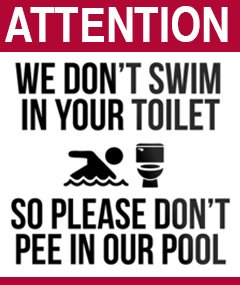WHAT CAUSES RED EYES ON A PUBLIC SWIMMING POOL

How red did your eyes get this summer, when you went swimming in the public pool? With summer gone, we feel we’re breaking the news softly, so you’re not right in the middle of it when you learn that it is not chlorine in the water that reddens your eyes. It’s urine.
We tend to think of chlorine as the super germ killer and tolerate its sharp, pungent smell – some even find it invigorating on account of the `antiseptic’ association – but the reality is a little more complicated. Chlorine binds with substances it is trying to neutralize, and when combined with urine, it turns into chloramine (a derivative of ammonia), which irritates the eyes and makes it red.
It is also worth keeping in mind that chlorine doesn’t zap all germs out of the pool as quickly as we’d like to believe when sharing a public pool. The bacteria E. coli for example, is neutralized in less than a minute. Whereas cryptosporidium, the parasite that can cause diarrhea, may take over 10 days to be completely killed off.
Every year, the CDC (Centers For Disease Control And Prevention) works overtime to keep swimmers safe during the warm season, revealing all sorts of alarming details about poop, sweat and other human body grubs that lurk in shared pools and other recreational waters, to raise public awareness. At King LASIK, preserving healthy vision is our top concern, so we have prepared a quick list of suggested precautions for the next time you or your kids go swimming in community waters.
10 Ways to Protect Your Eyes in a Swimming Pool
 • Chlorinated water washes away the outer filmy layer of the eye that helps protect against conditions like blurry vision and dry, red, itchy eyes. Wear watertight goggles in the pool at all times.
• Chlorinated water washes away the outer filmy layer of the eye that helps protect against conditions like blurry vision and dry, red, itchy eyes. Wear watertight goggles in the pool at all times.
• Don’t use contact lenses while swimming, as the space between the eye and the lens may allow bacteria and viruses to squeeze in. You’ll also be risking acanthamoebic keratitis, a rare but serious eye infection that occurs when chlorinated water gets trapped under contact lenses.
• Keep lubricating eye drops handy to soothe inflamed eyes.
• Taking a pre-shower is a responsible way to use public pools, as less human waste matter gets transported into the water.
• Rub your face and body with coconut oil, or some other natural emollient to create a topical layer of protection.
• Neutralize the chlorine and chloramine with a Vitamin C spray. You can easily make your own solution by mixing a teaspoon of Vitamin C powder with 2 cups of water.
• Buy some water test strips (available at most hardware stores) and check for these levels before going into a pool:
• PH levels between 7.2 and 7.8.
• Free chlorine concentration of at least 1 parts per million (ppm).
• Free bromine concentration of at least 3 ppm.
